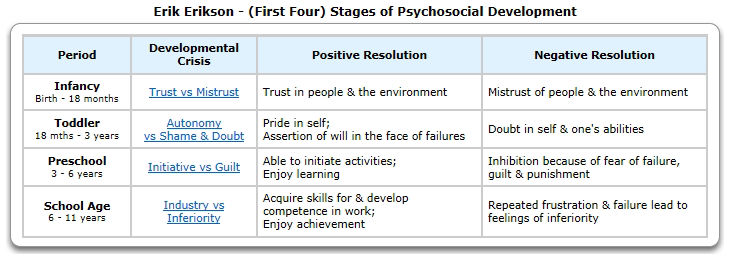
Erik Erikson (1902 -1994) was a German-born American psychoanalyst; he was known for his psychosocial theory of emotional development of human beings. This theory looks at the impact of parents and society on personality development from childhood to adulthood. According to Erikson, each person has to pass through a series of eight interrelated stages over his entire life cycle. We will look at the first 4 stages that cover the childhood years.
Erikson hypothesised that the personality of a person develops in universal and observable patterns corresponding to the ways a human foetus develops. In fetus development, each organ system of the body has its own innate time for growth (or danger of defect). In the same way, each stage is characterized by an emotional bipolar crisis.

Crises are seen as decisive turning points of increased vulnerability or strength to function effectively. However, Erikson did not imply that any manifestation of potentially dangerous traits is undesirable but that when the negative far outweighs the positive, then difficulties in development arise.
A positive resolution of any given developmental crisis is not regarded as an achievement because no one crisis is resolved once and for all. Each crisis is present in some way as the person moves through the life cycle. For example, the crisis of industry versus inferiority is experienced intensely during school-going stage but the struggle goes on throughout life.
The strengths and capabilities developed through successful resolution of a crisis at any given stage can be affected by later events. In this, there are both hope (that the vulnerability can be overcome) and danger (that the strength developed can be destroyed). Nevertheless, a psychological strength is generally affected most strongly during the stage in which it is developed.
Use the "hamburger menu icon" at the top-right corner of this page to navigate.